|
Plans for outlets in South Asia, China:
Laksala, a profit-making venture
By Shirajiv Sirimane
In the past, Sri Lanka was infamous for closing down State
institutions and selling them to the private sector for a song.
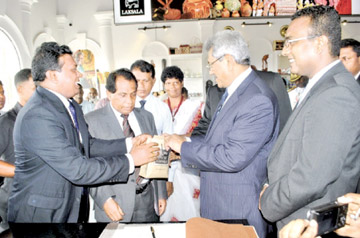
Secretary Defence and Urban Development Gotabaya Rajapaksa at
the opening of the renovated Laksala shopping complex in Galle
in March |
|
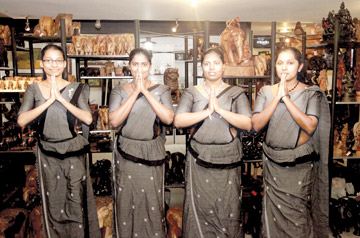
The Laksala outlet at Thunmulla |
|
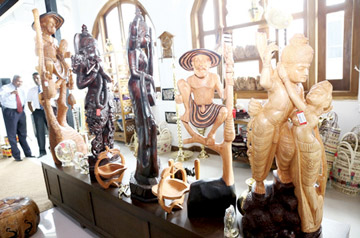
The newly refurbished Laksala at Galle |
|
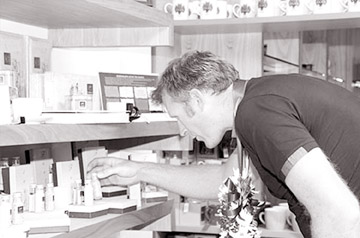
A foreigner selects items at a Laksala showroom |
Surprisingly, some of these institutions were profitable ventures.
The irony is that the private sector companies and individuals who took
over them sold what was left and abandoned them or some times ran them
for some time, enjoying all the short-term gains and then abandoned
them. This was a talking point in the country and when the Mahinda
Chinthana was being drawn up, President Mahinda Rajapaksa made a pledge
that none of the remaining State institutions would be privatised, even
if they were running at a loss.
This promise was not broken, but is a hard one to keep, because some
institutions were neglected and mismanaged to the extent that it was
cheaper to close them down and pay the salaries of employees from the
Treasury. In a bid to find a solution to this problem and turn these
loss-making institutions around, President Rajapaksa created the
Strategic Enterprise Management Agency (SEMA) for the restructuring and
re-modification of loss-making State institutions. Under the watchful
guidance of Secretary, State Assets and Enterprise Development, Willie
Gamage, many institutions were turned around and today they are not only
making profits, but also paying taxes to the Government.
With the objective of popularising and promoting the Sri Lankan
handicrafts industry, both locally and globally, Laksala was inaugurated
in 1964 by the then Prime Minister Sirimavo Bandaranaike with an
investment of Rs. 2.5 million and a building in the Fort.
Laksala is the only State-owned gift and souvenir boutique and was
placed under the National Crafts Council and Allied Institutions Act,
No. 35 of 1982.
Financial setbacks
However, the next few years saw Laksala going through many hardships
and financial setbacks due to numerous reasons and it was often referred
to as an 'under-performing entity'. By 2008, Laksala was considered as
an inactive government organisation and with the intervention of the
then Minister of Small Industries and Self-employment, Laksala was
restructured through a Cabinet paper dated December 23, 2008, to be an
entity that was limited for marketing activities.
Since then, Laksala has witnessed numerous changes with an ever
growing list of products on sale. Today, it operates through 10 branches
located islandwide and offers a wide variety of Sri Lankan products at a
reasonable price.
Branches refurbished and modernised
The Laksala showrooms that operated with basic and minimum facilities
were soon upgraded and refined to suit the needs of the modern
discerning customers. The loss-making showrooms were closed down while
the employees of these units were compensated under a voluntary
retirement scheme which was drawn under a win-win system. In addition,
many employee motivational programs were conducted to upgrade and
improve the customer service and professional standards of Laksala
employees.
Under the restructuring exercise, certain outlets such as those at
Galle and Katubedda, which were in a dilapidated condition, were
revamped and refurbished to look like sophisticated and modern gift
boutiques. In addition, establishing showrooms on both sides of the
Southern Expressway, extending the floor area at the Bandaranaike
International Airport showroom from 80sqft to 960 sqft, opening new
showrooms in Pinnawala, Ja-ela K-Zone and at the Race Course were also
part and parcel of the restructuring exercise.
Laksala's flagship showroom at Thummulla has been upgraded to the
level of a state-of-the-art gift boutique by extending its floor area
and introducing new facilities and amenities sought after by the modern
customers.
The Laksala management has already commenced refurbishing the
showroom in the Fort, which is nearly 50 years old. Amidst all these
accomplishments, the newest showroom is being constructed at the Colombo
National Museum premises under the Divi Neguma social development scheme
with the guidance of Economic Development Minister Basil Rajapaksa.
This fully air-conditioned sales outlet of Laksala is to be
established within the premises of the museum, especially to serve
foreign tourists. The Minister said Sri Lanka has now become a selected
destination for tourists and it is time we provide all facilities to
serve them. The new outlet at the museum premises will have facilities
such as a rest area and latrine facilities for tourists.
Secretary Defence and Urban Development Gotabaya Rajapaksa opened the
renovated Laksala shopping complex in Galle in March.
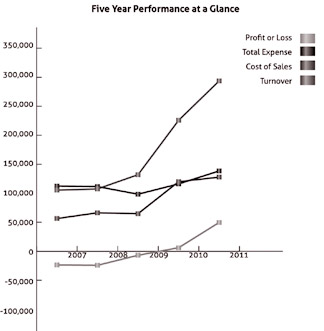 Ministers including Chief Minister for the Southern Province Shan
Wijayalal De Silva, Members of Parliament including Manusha Nanayakkara,
a large number of Government Agents in the area and members of the Armed
Forces were also present on the occasion. Ministers including Chief Minister for the Southern Province Shan
Wijayalal De Silva, Members of Parliament including Manusha Nanayakkara,
a large number of Government Agents in the area and members of the Armed
Forces were also present on the occasion.
Chairman and Chief Executive of Laksala Anil Koswatta said that they
are going from strength to strength and even have plans to open outlets
in the South Asian region and other Asian cities.
"We are determined to venture into the South Asian region in general
and India in particular. We are also looking at China, which is a
growing market. In addition, we have got many inquiries even from
European countries," he said.
Laksala Import and Export Services will be established to import raw
materials to produce gifts and souvenir items including handlooms and
batiks and export finished gifts and souvenirs or any other value added
products including furniture.
During the time the restructuring process commenced, there were only
800 suppliers registered with Laksala.
Now, as a result of the dynamic reformation process, there are more
than 5,000 artisans, craftsmen and suppliers registered with Laksala
from across the island.
All suppliers get paid immediately or within 14 days of supplying
goods to Laksala, depending on their contract guidelines. Laksala has
also taken upon itself the task of educating and guiding these suppliers
on new product development under its forward vision. The supplier base
will be increased up to 15,000 within the next few years.
As a result of the restructuring process, Laksala has a program with
Divi Neguma members to purchase items from them. "We also provide them
training which has continuously ensured their financial stability."
In the annual report of the Finance Ministry for 2012, positive
observations are made on Laksala's performance after its restructuring
process. The report has cited Laksala as a recognised business entity
among the State sector and has positioned it at 33 among profitable
Government-owned organisations.
Under Chapter 11 of the same report, Laksala's performance has been
referred under the Government-owned commercial entities and a summary
has been provided on page 400. In addition, pages 402, 466, 469, 470,
481 and 482 make references to Laksala and on page 469, there is a
comprehensive debrief about the current performance of the Sri Lanka
Handicrafts Board (Laksala).
During a Committee Of Public Enterprise (COPE) hearing on April 29,
2011, the issue was brought up that Laksala has not presented any annual
report to Parliament since 2005 and on page 195 in the first report
issued by COPE on December 1, 2011, this matter was mentioned as a grave
concern under the Sri Lanka Handicrafts Board operations.
For the first time in 20 years, in the report of the Auditor General,
there was a positive reference made on Laksala that goes as, "My opinion
is that the financial activities and cash flow for the year ended on
31st December 2011 and the financial situation of the Sri Lanka
Handicrafts Board represented by the financial statements as at 31st
December 2011 demonstrate a true and fair situation as per Sri Lanka
Accounting Standards, excluding the effect caused by the facts mentioned
in para 2.2 of this report." Laksala is just one example of a
loss-making institution being turned around as a profitable venture and
there are several other institutions that have followed suit, which has
proved that closing State institutions and selling them to the private
sector for a song is not the solution.
If the private sector can, the State sector too can do that and
turning Laksala around is a living example for this. |


